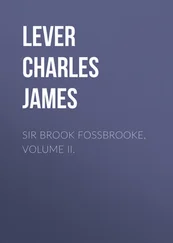Charles Lever - Tom Burke Of Ours, Volume II
Здесь есть возможность читать онлайн «Charles Lever - Tom Burke Of Ours, Volume II» — ознакомительный отрывок электронной книги совершенно бесплатно, а после прочтения отрывка купить полную версию. В некоторых случаях можно слушать аудио, скачать через торрент в формате fb2 и присутствует краткое содержание. Жанр: literature_19, foreign_antique, foreign_prose, на английском языке. Описание произведения, (предисловие) а так же отзывы посетителей доступны на портале библиотеки ЛибКат.
- Название:Tom Burke Of Ours, Volume II
- Автор:
- Жанр:
- Год:неизвестен
- ISBN:нет данных
- Рейтинг книги:3 / 5. Голосов: 1
-
Избранное:Добавить в избранное
- Отзывы:
-
Ваша оценка:
- 60
- 1
- 2
- 3
- 4
- 5
Tom Burke Of Ours, Volume II: краткое содержание, описание и аннотация
Предлагаем к чтению аннотацию, описание, краткое содержание или предисловие (зависит от того, что написал сам автор книги «Tom Burke Of Ours, Volume II»). Если вы не нашли необходимую информацию о книге — напишите в комментариях, мы постараемся отыскать её.
Tom Burke Of Ours, Volume II — читать онлайн ознакомительный отрывок
Ниже представлен текст книги, разбитый по страницам. Система сохранения места последней прочитанной страницы, позволяет с удобством читать онлайн бесплатно книгу «Tom Burke Of Ours, Volume II», без необходимости каждый раз заново искать на чём Вы остановились. Поставьте закладку, и сможете в любой момент перейти на страницу, на которой закончили чтение.
Интервал:
Закладка:
“And now remember, Burke, I count on you. Get me out of this confounded place; I ‘d rather be back at Toulon again, if need be. And as I shall not see you again before you leave, farewell. I ‘ll send the letter for the countess early to-morrow.”
We shook hands warmly and parted: he to return to his quarters; and I to sit down beside my fire, and muse over the events that had just occurred, and think of Tascher himself, whose character had never been so plainly exposed to me before.
If De Beauvais, with his hot-headed impetuosity, his mad devotion to the cause of the Legitimists, was a type of the followers of the Bourbons; so, in all the easy indifference and quiet selfishness of his nature, was Tascher a specimen of another class of his countrymen, – a class which, wrapped up in its own circle of egotistical enjoyments, believed Paris the only habitable spot of the whole globe. Without any striking traits of character, or any very decided vices, they led a life of pleasure and amusement, rendering every one and everything around them, so far as they were able, subservient to their own plane and wishes; and perfectly unconscious the while how glaring their selfishness had become, and how palpable, even to the least observant, was the self-indulgence they practised on every occasion. Without cleverness or tact enough to conceal their failings, they believed they imposed on others because they imposed on themselves, – just as the child deems himself unseen when he closes his eyes.
Josephine’s followers were, many of them, like this, and formed a striking contrast to the young men of the Napoleonite party, who, infatuated by the glorious successes of their chief, deemed the career of arms alone honorable. St. Cyr and the Polytechnique were the nurseries of these, – the principles instilled there were perpetuated in after life; and however exaggerated their ideas of France and her destiny, their undoubted heroism and devotion might well have palliated even heavier errors.
It was in ruminating thus over the different characters of the few I had ever known intimately, that I came to think seriously on my own condition, which, for many a day before, I had rather avoided than sought to reflect on. I felt, – as how many must have done! – that the bond of a common country, the inborn patriotism of the native of the soil, is the great resource on which men fall back when they devote themselves to the career of arms; that the alien’s position, disguise it how he will, is that of the mere mercenary. How can he identify himself with interests on which he is but half-informed, or feel attachment to a land wherein he has neither hearth nor home? In the very glory he wins he can scarce participate. In a word, his is a false position, which no events nor accidents of fortune can turn to good account, and he must rest satisfied with a life of isolation and estrangement.
I felt how readily, if I had been a Frenchman born, I could have excused and palliated to my conscience many things which now were matters of reproach. Aggressive war had lost its horrors in the glory of enlarged dominions; the greatness of France and the honor of her arms had made me readily forget the miseries entailed on other nations by her lust of conquest. But I – the stranger, the alien – had no part in the inheritance of glory; and personal ambition, – what means it, save to stand high amongst those we once looked up to as superiors? For me there were no traditions of a childhood passed amid great names, revered and worshipped; no early teachings of illustrious examples beside the paternal hearth. And yet there was one, although lost to me forever, before whose eyes I would gladly seem to hold a high place. Yes! could I but think that she had not forgotten me, – would hear my name with interest, or feel one throb of pleasure if I were spoken of with honor, – I asked no more!
“A letter, Monsieur le Capitaine,” said my servant, as he deposited a package on my table. Supposing it was the epistle of which Tascher spoke, I paid but slight attention to it, when by chance I remarked it was in General d’Auvergne’s handwriting. I opened it at once, and read as follows: —
Bivouac, 11 o’clock.
My dear Burke, – No one ever set off for Paris without being troubled with commissions for his country friends, and you must not escape the ills of common humanity. Happily for you, however, the debt is easily acquitted; I have neither undiscovered shades of silk to be matched, nor impossible bargains to be effected. I shall simply beg of you to deliver with your own hand the enclosed letter to its address at the Tuileries; adding, if you think fit, the civil attentions of a visit.
We shall both, in all likelihood, be much hurried when we meet to-morrow, – for I also have received orders to march, – so that I take the present opportunity to enclose you a check on Paris for a trifle in advance of your pay; remembering too well, in my own aide-de-camp days, the dilatory habits of the War Office with new captains.
Yours ever, dear Burke,
D’Auvergne, Lieut-General.
The letter of which he spoke had fallen on the table, where I now read the address, – “À Madame la Comtesse d’Auvergne, née Comtesse de Meudon, dame d’honneur de S. M. l’Impératrice.” As I read these lines, I felt my face grow burning hot, my cheeks flushed up, and I could scarcely have been more excited were I actually in her presence to whom the letter was destined. The poor general’s kind note, his check for eight thousand francs, lay there: I forgot them both, and sat still, spelling over the letters of that name so woven in my destiny. I thought of the first night I had ever heard it, when, a mere boy, I wept over her sorrows, and grieved for her whose fate was so soon to throw its shadow over my own. But in a moment all gave way before the one thought, – I should see her again, speak to her and hear her voice. It is true, she was the wife of another: but as Marie de Meudon, our destinies were as wide apart; under no circumstances could she have been mine, nor did I ever dare to hope it. My love to her – for it was such, ardent and passionate – was more the devotion of some worshipper at a shrine than an affection that sought return. The friendless soldier of fortune, poor, unknown, uncared for, – how could he raise his thoughts to one for whose hand the noblest and the bravest were suitors in vain? Yet, with all this, how my heart throbbed to think that we should meet again! Nor was the thought less stirring that I felt, that even in the short interval of absence I had won praise from him for whom her admiration was equal to my own. With all the turmoil of my hopes and fears I felt a rush of pleasure at my heart; and when I slept, it was to dream of happy days to come, and a future far brighter than the past.
My first thought when morning broke was to ride over to Beygern, to learn the fate of my wounded friends. On my way thither I fell in with several officers bound on a similar errand, for already the convent had become the great hospital to which the sufferers were brought from every part of the camp. As we went along, I was much struck by the depression of spirit so remarkable everywhere. The battle over, all the martial enthusiasm seemed to have evaporated: many grumbled at the tiresome prospect of a winter in country quarters, or cantoned in the field; some regretted the briefness of the campaign; while others again complained that to return to France after so little of active service would only expose them to ridicule from their companions who had seen Italy and Egypt.
“Spare your sorrows on that score, my young friends,” said a colonel, who listened patiently to the complaints around him; “we shall not see the dome of the Invalides for some time yet. Except the compagnie d’élite , I fancy few of us will figure on the Boulevards.”
Читать дальшеИнтервал:
Закладка:
Похожие книги на «Tom Burke Of Ours, Volume II»
Представляем Вашему вниманию похожие книги на «Tom Burke Of Ours, Volume II» списком для выбора. Мы отобрали схожую по названию и смыслу литературу в надежде предоставить читателям больше вариантов отыскать новые, интересные, ещё непрочитанные произведения.
Обсуждение, отзывы о книге «Tom Burke Of Ours, Volume II» и просто собственные мнения читателей. Оставьте ваши комментарии, напишите, что Вы думаете о произведении, его смысле или главных героях. Укажите что конкретно понравилось, а что нет, и почему Вы так считаете.












